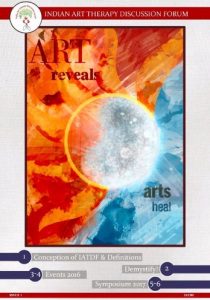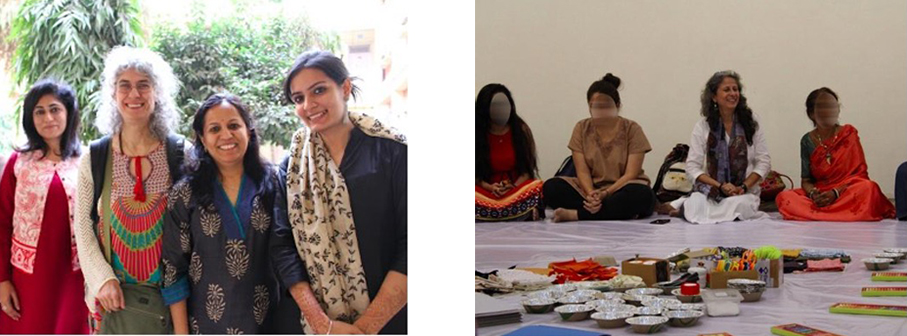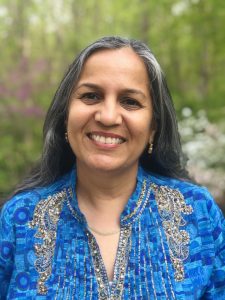June 15, 2021 | Sangeeta Prasad, MA, ATR-BC; Susan Ainlay Anand, MA, ATR-BC, ATCS, LPAT; and Bani Malhotra, MA, ATR-BC
With artistic practices embedded in everyday life in India, the widespread interest in the therapeutic use of art with various populations is not surprising. Several years ago, the three of us met in person for the first time in India. Bani was a graduate student in psychology at University of Delhi and planned to apply to US art therapy graduate programs since none existed in India at that time. From there on, our shared dream of finding ways for people to receive an art therapy education in India has sustained our mentoring and collaborative relationships, which first started on opposite sides of the world!

Sangeeta Prasad, Girija Kaimal, Susan Anand and Bani Malhotra at AATA conference panel presentation, 2018
Ever since our commitment to the art therapy profession in India brought us together, the three of us have been working with colleagues in the US and India to develop art therapy as a profession in India through networking, awareness, and programming. Our vision is to increase awareness of the potential benefits of art therapy and therapeutic arts in varied settings and with diverse populations across India.
We are thrilled to announce the art therapy master’s program at Maharashtra Institute of Technology (MIT) – Art Design Technology University (ADT) in Pune, India! The MFA in Art Therapy is now offered though the School of Fine Arts & Applied Arts (SOFA). The first batch of students will be enrolled in 2021 and will graduate in 2023. MIT-ADT is hosting a virtual launch party on June 27 at 6:30 pm IST. We invite you to join us to learn more about this critical milestone in the development of the art therapy profession in India!
In this post, we are excited to tell our story that led to this achievement and to share our hopes for the future.
Art Therapy in India
Mental health professionals and artists are intuitively exploring the therapeutic benefits of the visual arts with clients and communities. A growing number of trained arts therapists are also traveling or returning to India to work and teach. Training opportunities are offered through various organizations, and certificate or diploma degrees are available in expressive art therapy programs affiliated with educational institutions. This is the context in which we were able to organize a team ready to create the master’s program for art therapy in India.

Sangeeta Prasad and Susan Anand founded IATDF in 2015
Bringing People Together: Establishing the Indian Art Therapy Discussion Forum (IATDF)
In 2015, Sangeeta Prasad, who was born and raised in India and is now based in the US, posted a request on the Art Therapy India LinkedIn Group for volunteers to organize networking opportunities in India. She received an overwhelming response to this post from arts therapists, art-based therapists, expressive art therapists, students, and mental health professionals who wanted to get involved. Those based in India provided descriptions of their work and seemed eager to learn more about the field.
Motivated by this interest, Sangeeta Prasad and Susan Anand (who has family ties to India) co-founded the Indian Art Therapy Discussion Forum (IATDF) as an inclusive group of art therapists and non-art therapists from India, the US, and other countries to advance the profession of art therapy in India through education, networking, training, and mentorship. Set up in the form of a Google Group, members of the forum contributed to group discussions about their diverse experiences, including art therapy and the therapeutic use of the arts. People with varying levels of training and clinical practice shared innovations and adaptations that they applied in their work throughout India, sometimes involving the use of traditional art forms.

IATDF newsletter cover page
From 2015 to 2018, regular communication was set up with this pool of enthusiasts. Each month, members would meet online via video conference to share updates on their work, receive mentorship, and support one another through collaboration with art therapists in India, the US, and occasionally from other parts of the world. IATDF activities included: hosting conferences and workshop retreats in different states in India, offering webinars on special topics of interests for members, distributing an online newsletter, and presenting at the American Art Therapy Association’s annual conferences. Over the years, the membership has grown. During the most recent surge in COVID-19 cases in India, forum members supported each other and shared opportunities for healing through the arts that have been developed for healthcare providers and others affected by the pandemic.
Members of the IATDF often expressed interest in formal training that would help to define art therapy and provide career development. While some forum members were able to pursue additional education in art therapy in the US and abroad, there was clearly interest for opportunities in India. In our efforts to establish partnerships with international educational organizations, we encountered two barriers: lack of programs specializing in art therapy and lack of financial resources. As a group, we began to focus on identifying an institution in India that could provide students and professionals with affordable and sustainable art therapy education.
(Left) IATDF Workshop in Bangalore, 2017; (Right) Susan Anand at AATA Conference 2017
Expanding Training and Education for Art Therapy in India
In 2019, the Women’s Christian College (WCC) in Chennai offered a hybrid (online and in-person) introductory art therapy course for psychology master’s students. In order to minimize the barriers of teacher and financial resources and keep tuition affordable, the class was a collaborative effort, which included: art therapists Sangeeta Prasad, Susan Anand, and Dr. Girija Kaimal; expressive arts therapist Jennie Kristel; and WCC psychology faculty member D. Sumathi. The course included didactic online lectures, homework assignments, and hands-on, arts-based learning experiences. Some members from the IATDF were also invited to present their work and experiences of using art-based or expressive arts therapy in an Indian setting. D. Sumathi was the course coordinator in the department and also supervised students, kept track of academic credits, and was the interface liaison between the online faculty, students, and WCC administration.

(Left) Manissha Khanna, Jennie Kristel, Sangeeta Prasad and Bani Malhotra, IATDF Workshop in Delhi University, 2016; (Right) Smita Deshpande, Assistant Professor at MIT School of Fine Arts and Applied Arts
Due to the success of the course in the first year and heightened student interest in art therapy, WCC decided to continue offering the introductory course as an elective. When the course was offered in 2020, India was in lockdown due to COVID-19, so it had to be taught completely online. Additional faculty were hired to help with teaching and administrative responsibilities. Bani Malhotra, art therapy doctoral student at Drexel University in the US, and Sarah Shruti Lall, WCC course coordinator and doctoral student joined the team.

Ethics webinar by Dr. Penny Orr in 2019
With the experience gained through this introductory course and feedback received from the students at WCC, the faculty and other members of the IATDF were motivated to develop a post graduate (master’s) program. Smita Raje-Deshpande, an Arts Based Therapist in India, first pitched the idea of creating a master’s program to faculty and administrators at the Maharashtra Institute of Technology (MIT-ADT), Pune. After careful consideration of WCC feedback and review of IATDF discussions, a hybrid model for teaching a master’s program, an MFA, in art therapy was developed at MIT-ADT through the School of Fine Arts.
Once again, this has been a collaborative effort! Dr. Penelope Orr, who has years of experience planning and directing online art therapy programs in the US and other countries, assisted in curriculum design and development. Other members of the faculty include Sangeeta Prasad, Dr. Girija Kaimal, Susan Anand, Jennie Kristel, Aishwerya Iyer, Bani Malhotra, and teaching assistants Smita Raje-Deshpande and Manissha Khanna. Our focus for this hybrid master’s program is on inclusion, cultural relevance, and sustainable models of art therapy education.
Looking back on our journey to this point, the WCC course contributed to student growth and interest in the field while providing the team with crucial learning experiences to support their efforts on institutional collaboration and methodological planning of a degree course.

Aishwerya Iyer, MA, ATR-P adjunct faculty at MIT Art Therapy course.
Creating a Sustainable Future
The US-based faculty assisted by faculty at MIT will teach courses for the first five years and then the program will transition to art therapy faculty primarily located in India and others from around the world. We envision a program that will train art therapists to meet the needs of people in both urban and rural areas through the context of Indian health care and mental health policy, and educational structures. Students who complete the WCC introduction course to art therapy will now have the option to pursue a master’s degree (MFA) in art therapy in India.
This dream of a graduate level program has been realized through the dedication, commitment, and determination of so many! Our hope is that this program will prepare students to make a positive impact as art therapists working across India, whether it be in schools, hospitals, clinics, or community spaces.
Sangeeta Prasad, MA, ATR-BC
 Sangeeta Prasad is a registered and board-certified art therapist with over 30 years of experience working with children and adults with serious mental illnesses and other disabilities. Sangeeta Prasad has been a Director on the Board of the American Art Therapy Association (AATA, 2016-2018), membership chair, and international chair of the AATA (2016-2018). She is co-founder of Circle Art Studio, a private art therapy studio in Fairfax, Virginia, USA, and the Indian Art Therapy Discussion Forum (IATDF). She has authored two books, Creative Expressions: Say it with Art and Using Art Therapy with Diverse Populations, Crossing Cultures, and Abilities and contributed to several other books.
Sangeeta Prasad is a registered and board-certified art therapist with over 30 years of experience working with children and adults with serious mental illnesses and other disabilities. Sangeeta Prasad has been a Director on the Board of the American Art Therapy Association (AATA, 2016-2018), membership chair, and international chair of the AATA (2016-2018). She is co-founder of Circle Art Studio, a private art therapy studio in Fairfax, Virginia, USA, and the Indian Art Therapy Discussion Forum (IATDF). She has authored two books, Creative Expressions: Say it with Art and Using Art Therapy with Diverse Populations, Crossing Cultures, and Abilities and contributed to several other books.
Sangeeta Prasad has completed a certification in Mindfulness-Based Stress Reduction (MBSR) as well as several week-long and day retreats. She is currently enrolled in the Mindfulness Meditation Teacher Certification Program (MMTCP). She coordinates and teaches “Introduction to Art Therapy” online at Women’s Christian College, Chennai. She is also in the faculty of the MFA in Art Therapy program at MIT ADT University, School of Fine Arts and Applied Arts (SOFA) Pune, India. To know more or contact, visit: www.sangeetaprasad.com
Susan Ainlay Anand, MA, ATR-BC, ATCS, LPAT
 Susan is a graduate of the New York University art therapy program and has worked in inpatient and outpatient settings for over 35 years. She serves on the American Art Therapy Association Board of Directors and is past member and treasurer of the Art Therapy Credentials Board. Susan is a faculty member in the Department of Psychiatry at the University of Mississippi Medical Center. Through the Mississippi Museum of Art, she facilitates art therapy groups for adults with cancer and people with memory loss. Susan is the co-editor of The Legacy of Edith Kramer: A Multifaceted View (Routledge, 2018) and has published book chapters and journal articles. She has been involved with numerous educational endeavors in India including guest lecturer at the University of Delhi, instructor of art therapy for an expressive arts therapy diploma program, workshop facilitator, co-founder of the Indian Art Therapy Discussion Forum (IATDF), and adjunct faculty member for a course at Women’s Christian College, Chennai. She is currently an adjunct faculty member in the MFA Art Therapy program, MIT School of Fine Arts and Applied Arts, MIT-ADT University, Pune, India.
Susan is a graduate of the New York University art therapy program and has worked in inpatient and outpatient settings for over 35 years. She serves on the American Art Therapy Association Board of Directors and is past member and treasurer of the Art Therapy Credentials Board. Susan is a faculty member in the Department of Psychiatry at the University of Mississippi Medical Center. Through the Mississippi Museum of Art, she facilitates art therapy groups for adults with cancer and people with memory loss. Susan is the co-editor of The Legacy of Edith Kramer: A Multifaceted View (Routledge, 2018) and has published book chapters and journal articles. She has been involved with numerous educational endeavors in India including guest lecturer at the University of Delhi, instructor of art therapy for an expressive arts therapy diploma program, workshop facilitator, co-founder of the Indian Art Therapy Discussion Forum (IATDF), and adjunct faculty member for a course at Women’s Christian College, Chennai. She is currently an adjunct faculty member in the MFA Art Therapy program, MIT School of Fine Arts and Applied Arts, MIT-ADT University, Pune, India.
Bani Malhotra, MA, ATR-BC
 Bani is a PhD Candidate at Drexel University’s Creative Arts Therapies Department. She has experience in clinical counseling and art therapy through her work with adults, children, and adolescents in varied settings. She earned her bachelor’s and master’s degrees in psychology from University of Delhi, India and has worked with neurodiverse children, burn patients, and juveniles in conflict with the law through her training in India. She also earned her Master’s in art therapy from The George Washington University, US and worked in an inpatient psychiatry unit, with individuals with autism and those with a history of sex offenses in the US. Her current research interests are arts for health and wellness and medical art therapy. She is an adjunct faculty member for an art therapy elective course at Women’s Christian College, Chennai and MFA Art Therapy program, MIT School of Fine Arts and Applied Arts, Pune, India. She continues to publish her works on art therapy with diverse populations.
Bani is a PhD Candidate at Drexel University’s Creative Arts Therapies Department. She has experience in clinical counseling and art therapy through her work with adults, children, and adolescents in varied settings. She earned her bachelor’s and master’s degrees in psychology from University of Delhi, India and has worked with neurodiverse children, burn patients, and juveniles in conflict with the law through her training in India. She also earned her Master’s in art therapy from The George Washington University, US and worked in an inpatient psychiatry unit, with individuals with autism and those with a history of sex offenses in the US. Her current research interests are arts for health and wellness and medical art therapy. She is an adjunct faculty member for an art therapy elective course at Women’s Christian College, Chennai and MFA Art Therapy program, MIT School of Fine Arts and Applied Arts, Pune, India. She continues to publish her works on art therapy with diverse populations.

